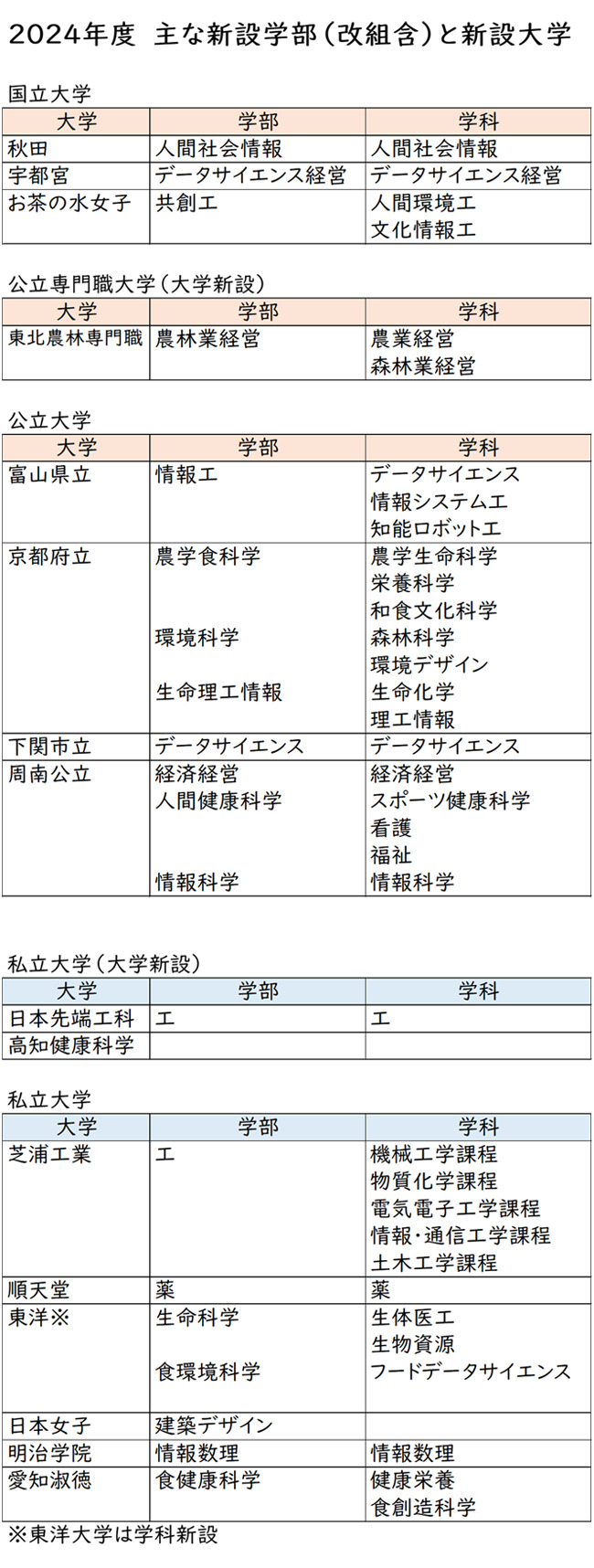With the 2023 entrance exam approaching, the implementation of the common university entrance exam is approaching, and information on newly established faculties and universities for the 2024 entrance exam has already been released.For the 2024 entrance exam, which is currently being taken by second-year high school students, Ochanomizu University, Japan Women's University, and other universities are planning to establish new science departments.In addition, there are active movements at each university, such as the establishment of a prefectural professional university in Yamagata Prefecture.For universities, new competition will increase, but applicants will have more opportunities to choose their career paths.

The keyword for the new faculty in 2024 is “Science”
The general selection process for the 2023 entrance examination has not yet begun, but information on newly established faculties and universities for the 2024 entrance examination is already being announced.The applicable grade for the exam is the current second year of high school, but knowing the information early will also lead to increased opportunities for career selection.
Kawaijuku's university entrance examination information site, Kei-Net, has information on the 2024 entrance examination, and you can see the list of newly established faculties and departments and universities that are currently known.The list of major universities extracted from it is the "FY2024 major newly established faculties (including reorganization) and newly established universities."At first glance, what stands out is the establishment of a science department.New faculties in the field of science and engineering can be seen at public universities such as Akita University (human and social information) and Ochanomizu University (co-creative engineering), and Toyama Prefectural University (information engineering) at public universities.Utsunomiya University (Data Science Management), Shimonoseki City University (Data Science), and Shunan Public University (Information Science) are also regarded as departments that integrate the humanities and sciences, so it can be said that part of the study is in the field of science.
* ( ) is the faculty name (tentative name at this stage)
Among private universities, Japan Advanced Institute of Technology is scheduled to be newly established, and the undergraduate department is scheduled to be the Department of Engineering, Faculty of Engineering.In addition, Shibaura Institute of Technology (Engineering) will not have a new department, but will reorganize the existing nine departments into five courses.The grouping of organizations makes it easier than ever for students to study the content of adjacent fields.At present, most of the industrial products produced by engineering research are a combination of machinery, electricity, communication, and software.This course system will be very useful for students' graduation research.What is worrisome is the selection of applicants because the organization has become a broad organization of courses instead of departments, but each course has courses, and these nine courses are planned to be recruited. Therefore, it is close to the current department selection, and students will not be confused when taking the exam.
・Kei-Net 2024 entrance examination information
https://www.keinet.ne.jp/exam/future/
Another keyword is "women's university". What is the future of women's universities?
Japan Women's University (architectural design) is also noteworthy.The aforementioned Ochanomizu University (co-creation) is also planning to set up a human environment department, and since the field of architecture is included, it is thought that there will be many applicants.In addition, this year (2022), Nara Women's University, a national university, will open the Department of Engineering, Faculty of Engineering, and the content of study will also include the field of architecture.The increase in the number of science and engineering departments, especially architecture departments, at women's universities will expand the opportunities for career selection for female applicants.Note that some entrance exams allow Japanese language as an optional subject.
National, public and private women's universities such as Ochanomizu University, Nara Women's University, and Japan Women's University are expanding their fields of science. has taken center stage.However, in the last few years, it seems that big changes are taking place.In particular, undergraduate departments related to nutrition have so far focused on studies directly linked to qualifications and vocations, such as registered dietitian training courses. It seems that the number of undergraduate departments that have spread their wings is increasing.I wonder if students will come to take the exam as before, not only to acquire qualifications, but also to develop into an educational program with the key words of food and health...
By the way, many women's universities are reducing the number of applicants in the general selection for the entrance exam this spring (2022).It seems that there are some people who say that women's colleges are leaving, but even if the number of applicants decreases in the general selection, if the general selection and school recommendation type selection increase, it is not a big problem.It wouldn't be surprising if the number of applicants for the general selection decreased if there were many female applicants selected by the so-called year-end entrance examination.I don't know if there is data that aggregates the results of entrance exams for women's universities within the year, but when I look only at major women's universities, there is no increase in the number of students enrolled in entrance exams during the year. It seems that.It may be that the orientation of female students' career choices is beginning to change significantly.

Newly established universities include public professional universities
Three universities are currently scheduled to be established (university names, department names, etc. are all tentative at this stage).Tohoku University of Agriculture and Forestry (agriculture and forestry management) is a public university, and Japan Advanced Institute of Technology (engineering) and Kochi University of Health Sciences are private universities.Kochi University of Health Sciences is unable to confirm the faculties scheduled to be established on its website, but it states that it aims to develop medical and welfare human resources, and that the center of the establishment is a specialty that trains rehabilitation professionals. Since it is a school, it is thought that it will be a department of medical technology and welfare.The campus of Japan Advanced Institute of Technology is scheduled to be in Odawara City, Kanagawa Prefecture, and will be a university in the metropolitan area.
Tohoku Agricultural and Forestry Professional College draws attention.With the establishment of the Professional College, the current Yamagata Prefectural University of Agriculture and Forestry is scheduled to become an affiliated school of the Professional College.There are plans to establish two departments in the Faculty of Agriculture, Forestry and Management: the Department of Agricultural Management (admission capacity: 32) and the Department of Forestry Management (admission capacity: XNUMX).The field of study is likely to be agriculture, but since courses related to marketing and management are also being considered, it may be said that it corresponds to the environmental science and economic system system of agriculture in terms of existing fields. .Since the enrollment capacity is small, it is expected that the ratio of general selection will increase, but it is highly expected that education will take advantage of being a prefectural institution.

